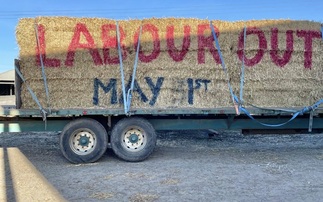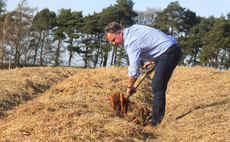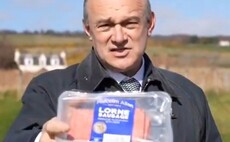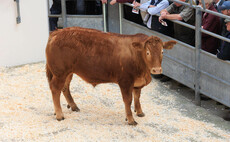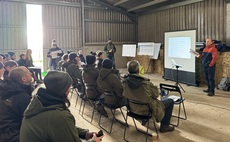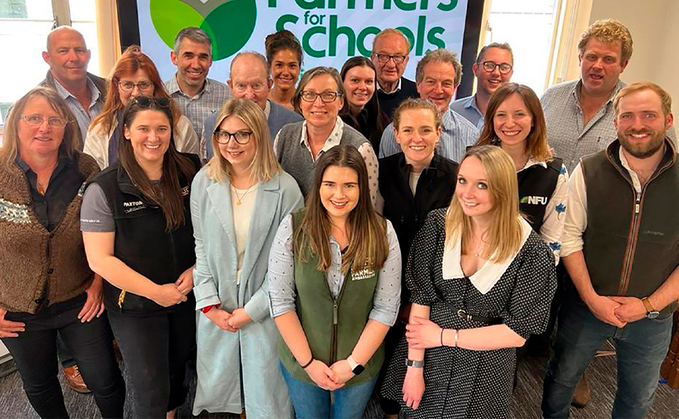
A new kind of land army of specially trained farmers is being mobilised to venture into assembly halls around the country to talk to children. Sarah Todd finds out more about the Farmers for Schools project.
Farmers for Schools is a project designed and run by the education team at the NFU, more widely known as NFU Education.
The idea is to offer secondary schools in England and Wales an opportunity to have a 30-minute assembly hosted by two farmers.
This includes finding out more about them and their role within the agricultural industry, as well as opportunities for ‘farming myth-busting’ and for the students to ask questions.
To date, about 140 farmers have joined the initiative and organisers are looking for more to throw their support behind it and help educate children about food and farming.
Initial feedback from participating teachers and farmers has been really positive, showing an increase in confidence among ambassadors as well as a positive reception from schools.
Q&A: Joshua Payne, NFU chief education manager

Joshua Payne, the NFU’s chief education manager, talks more about the initiative and why and how farmers can get involved.
Q How does it work?
A Farmers sign up to attend a course run at a location within their region. We provide them with a Disclosure and Barring Service check and training materials. Once trained they become an ambassador and are linked by us to local secondary schools.
Q Why is it needed?
A Young people are perhaps more removed from food production and agriculture than they ever have been before. They are inundated with information, often inaccurate, about food and the environment, yet many have never met a farmer.
Q Are you looking to recruit more?
A Yes. We have just come to the end of our inaugural round of training, which has seen us travel the length and breadth of England and Wales, but we intend to run more as we’ve had a magnificent response. The more ambassadors we have the more schools we can reach.
Q Why is there such a demand?
A From the farmers’ perspective I think there are many who care about educating and inspiring future generations. For
schools they are crying out for engaging, interesting speakers who can open the eyes of their students to new perspectives and opportunities.
Q How are the farmers trained?
A We run a five-hour session which puts the presentation that is going to be delivered to the students together step by step. Farmers are encouraged to collaborate to practice and enhance their presentation alongside support from the NFU Education team, which is formed of ex-teachers with extensive experience in schools outreach.
Q How is it different from Farmer Time?
A Farmer Time is virtual; this is an in-person assembly. Farmer Time focuses on primary pupils due to the restrictive timetables of most secondary schools. Saying that, some of our ambassadors also do Farmer Time.
Q How is the initiative promoted?
A We have great relationships with lots of schools already; we’re also partnered with organisations such as the Association for Science Education and local enterprise partnerships across the country.
Q What is the requirement?
A To have a passion for the industry, be willing to be slightly out of their comfort zone and be available for a training day, as well as committing to visiting at least two schools per year.
All ages and types of farmers are welcome to get involved. Because the volunteers will be going out in pairs, pupils get a real cross-section of farming life.
Q What is the children’s response?
A They are typically very interested. They have a lot of questions, which shows they are engaged and willing
to discuss the topics in hand.
Q Where do farmers go for more information?
A We have lots of examples of the training and content on our social media platforms (@nfueducation on both Twitter and Instagram). If you’re interested, send an email to [email protected] or visit nfueducation.com
CASE STUDY: Ernie Richards, Herefordshire

Viewing schoolchildren as the future consumers of the food he produces is a mindset which motivated Ernie Richards to volunteer for Farmers for Schools.
“I’ve been video calling primary school classes as part of Farmer Time and the way this scheme engages with older children seems to make absolute sense,” says Ernie, who works as a shepherd running a 1,000-head flock of Lleyn sheep near Hay-on-Wye.
“There’s been a lot of time put into getting young kids engaged with Farmer Time, so it did seem a shame we weren’t having conversations with the next generation of consumers – the secondary school-aged children.”
Ernie, who lives in a converted barn on the farm with his partner and young son, says he is lucky to have the support of his employer. He says getting involved with the NFU is helping to bridge the gap after his involvement with the Young Farmers’ Club movement.
Ernie says: “My grandparents, who are in their 80s, still have a smallholding and I got my love of farming from helping them on weekends and in the school holidays.
“My parents don’t farm and, to be honest, I only joined Young Farmers when I was 16 to go to the dances, but then it took hold of me and I ended up county chair back home in Herefordshire.
“You don’t realise at the time, because you’re just having fun, but all the skills like public speaking that you learn at Young Farmers equip you for doing things like this.
“Anything which helps explain what we do to the next generation of consumers has to be a good thing. I’m expecting to get a lot of questions about veganism and the environment.
“The farming way can be to ignore topics they find threatening, but it is far better to engage with these children and answer their questions.
“There are so many myths out there about things like cows and carbon emissions that this is the perfect opportunity for us to dispel them.
“There is nothing worse than hearing young people who don’t know where their food comes from, saying things like ‘milk comes from Tesco’.
The real challenge is to try and do something about it, to talk to them.”
CASE STUDY: Anna Bowen, Ceredigion
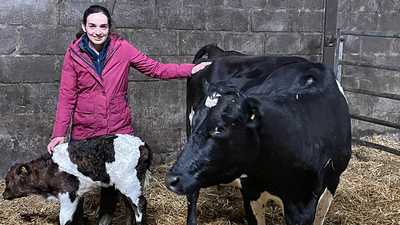
There is an old saying that if you want something doing ask a busy person and Anna Bowen epitomises this.
A graduate of the Royal Agricultural University, Anna grew up on a dairy farm in Carmarthenshire and now lives in Ceredigion, where together with her partner Freddie Lawder, she contract farms a herd of 300 spring block calving dairy cows.
Alongside this, she is completing a Nuffield Farming Scholarship looking at whether the UK can improve the ethics of its dairy calf management while retaining profitability.
She also holds down a job working as a farm business consultant for The Andersons Centre, as well as writing and private tutoring to GCSE and A level students.
Anna says: “My partner and I enjoyed being involved with the NFU’s Farmer Time scheme, so signing up to do Farmers for Schools was just a natural progression. I feel it’s really important to get across to young people that farming isn’t just milking a cow or driving a tractor.
It’s really important to get out the message that there are loads of exciting job opportunities within agriculture.
“There is a myth that to get into farming you have to be born into the lifestyle and that’s something I’m keen to dispel.
Contract farming
“Students seem interested to learn about the way we contract farm. We’re farmers, but we don’t own our own farm.”
Anna is also an enthusiastic champion of women in agriculture, inspired by a negative approach she has encountered throughout her journey.
“Because I’d always been quite academic at school, some people were quite horrified that I decided to go to an agricultural university. They didn’t think there would be good job opportunities for me. There is also the belief that farming jobs are poorly paid, which isn’t necessarily the case.”
Anna says the fact the assemblies are done together with another farmer means they are not as nerve-wracking as they could be.
She says: “This scheme gives farmers the opportunity to make agriculture a bit more relevant to younger people.”
A good example of this is the fact milk from Anna’s cows goes to make the mozzarella cheese used in Pizza Hut.
“That’s a fact they seem interested in. It’s farming’s loss if we don’t reach out to teenagers who don’t normally come into contact with agriculture.
“Even though I’m from a traditional farming background, I can see that we need to encourage people from wider backgrounds into the sector, which can only benefit from increased diversity.”
Anna’s top tip: “Throw in some interesting facts, such as the use of sexed semen and the way many farmers are now social media savvy. Anything environmental-related always goes down well.”
About #ThisIsAgriculture
FARMERS Guardian has joined forces with key industry stakeholders from across the farming sector to promote careers in agriculture, collaborating with industry bodies and industry partners to see how and where we can work together to shape the political agenda, drive educational reform and provide learning resources.
Articles will feature in Farmers Guardian to help agricultural businesses and farms understand recruitment and staff retention challenges and practical ideas they can adopt to mark the evolving changes which are happening in the careers, skills and training arena.















